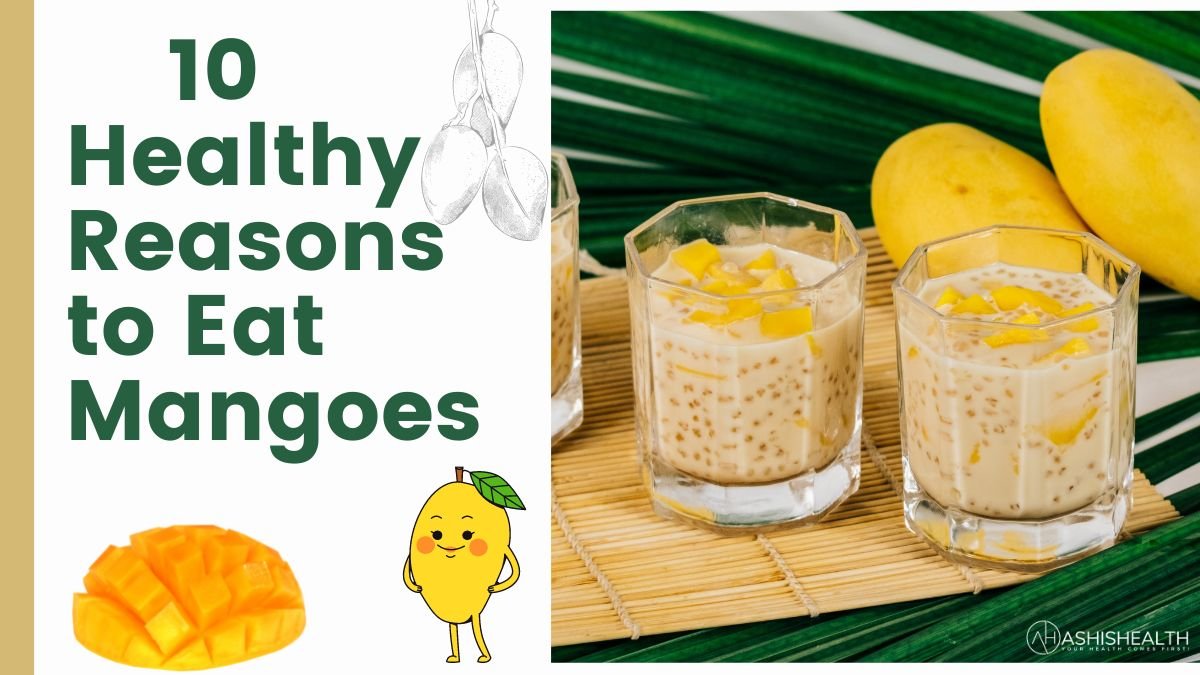Mangos provide an excellent source of vitamin C, which promotes the formation of good fiber and the bloodstream and speeds up the healing process for thousands of years, India has valued its mango harvest. These eye-catching, delicious fruits are now a staple of Indian cuisine and well-liked throughout. Based on the kind, mangoes can measure anything from a few grams to over 4 pounds per.
Depending on the variety of mango you purchase, these fruits have incredibly beneficial health effects. Mangos are now sold year-round in supermarkets, unlike in the past when they were only supplied at the conclusion of the monsoon periods. Mangoes are nourishing in addition to being delicious. They are referred to as the “Prince of Fruits.” Because they are one of the widely grown fruits in Tropical areas, they have their roots in India.
Here are 10 reasons to eat mangoes
Mangoes help in Fighting Cancer

Mangoes have phenolic compounds and enzymes that can delay or stop the growth of chest, pulmonary, prostate, colon, and leukemia cancer. Additionally, the health benefits of mango, consuming a lot of fiber and vitamin C is strongly associated with lowering the risk of developing cancer.
The anticancer effects of antioxidant properties are abundant in mango.
However, polyphenols also provide defense against the damaging cellular oxidative process, which has been associated with numerous cancer forms.
Helps in Maintaining Cholesterol Level

Consuming mangoes health benefits regularly can lessen your bad cholesterol. Mangoes have a lot of gelatin fiber, which lowers Lipoprotein or bad cholesterol and contributes to this phenomenon.
Apigenin, a chemical found in mangoes, is even linked to higher levels of HDL, a healthy form of cholesterol. Mangoes are abundant in soluble fiber, glucans, and vitamin C in addition to having very little if any cholesterol.
A way to lose weight

Mangoes are among the beneficial foods that aid in weight loss since they have a low amount of calories. Mango is actually the finest alternative to a bad treat for losing weight.
Fresh mangoes have a very modest calorie density and less than 100 calories are found in one serving (160 grams) of them. So losing additional weight is a positive thing.
Mangoes have a Glycemic Index score of 56, which is neither rich nor low. This means that mangoes can be consumed in little quantities.
An Aphrodisiac Weight
The mango, popularly known as the “absolutely adore fruit,” is known for its aphrodisiac properties. Mangoes help guys become more virulent. Mangoes are rich in vitamin E, which promotes the sex drive and assists in regulating hormone levels.
The genital organs’ regular operation depends on vitamin A, a fat-soluble vitamin. You cannot even make sex hormones without a sufficient supply of fat-soluble vitamins. The visual benefits of vitamin A also include night mode. Indeed, doing this won’t increase your desire for sex, but you might perform better in a romantic setting.
Aids good digestion

Mangoes are more effective at easing constipation than an appropriate-cost fiber powder. Mangoes are both nutritious and wonderfully sweet. The fruit may provide advantages for the immunological system or gastrointestinal system.
Glucosidase, a digestive enzyme found in mangoes, converts complex carbohydrates like starch into simple sugars such as glucose and maltose. Mangoes benefit from amylase as they ripen. Mango protease aid in the breakdown of the body’s vitamin and protein composition. Mangoes are high in fiber, which helps with digestion and protects against several stomach-related illnesses.
Help in Strengthening Immune System

Along with other types of carotene, mangoes also have vitamins C and A. Your immune system benefits from all these key nutrients, which help to maintain it robust and fit.
An adequate intake of vitamin A, also known as carotene, which is necessary for the healthy operation of the inflammatory response, is provided by one serving of mango, or around 10% of the daily recommended amount In addition, vitamin A is essential for the expansion and preservation of several systems as well as for the formation and normal growth.
Improves Concentration and Memory

Eat a lot of mangoes if you have poor concentration and recall. They enhance your mind while also aiding in attention improvement. Minerals that help maintain a heart are present in the Organizations that have reported Mango Concentrate. For instance, it contains a lot of sodium and potassium, both of which aid to decrease blood pressure, keeping a normal heartbeat, and calming blood flow. Additionally, it might reduce blood levels of free fatty acids, and cholesterol.
Mango improves Hair and Skin Health

Mangoes are a great fruit to enhance vision because they are also a great source of vitamin A. It also guards against eye problems and impaired vision. Mangoes give your skin a new glow and aid in pore cleaning. The best application for this fruit is to treat acne brought on by breakouts, which can affect any skin tone. You simply need to cleanse your face after applying fresh mango slices to it for between ten and fifteen minutes.
By combining smashed mango with buttermilk, honey, and other ingredients to form a paste, you can use mango as an exfoliant. After a refreshing scrubbing, your skin will appear softer and smoother.
Mangoes support Eyes Health

Mango provides 20% of your recommended daily dose of vitamin A provided by one serving of chopped mangoes. Mangoes treat vision problems, promote clear vision, and guard against light sensitivity.
Mangoes are rich in carotenoids, which promote eyesight, as evidenced by their yellow pulp. Particularly, they supply lutein and zeaxanthin, two carotenoids that are crucial in the retinal layer of the eye, shielding it from sunshine and the light source emitted by electronic devices. In the struggle for age-related visual degeneration symptoms, lutein and zeaxanthin are very helpful.
Prevents Heat Stroke

Simply finely chop a mango, add some water, and a tablespoon of fructose or honey to a juicer to get some relief from the summer heat. You’ll feel instantaneously cooler after drinking this juice, preventing heat exhaustion.
The physicians have urged individuals to incorporate it in their meals to avoid heatstroke in addition to strengthening the gastrointestinal and immune systems of people, particularly older adults and youngsters during the summer.
Mangoes Juice Benefit

- It could potentially be anti-cancer.
- Perhaps it’s an antioxidant.
- It might aid with intestinal defense.
- It could have an impact on microbes (anti-bacterial)
- Possible reduction of adverse reactions (anti-allergic)
Mangoes Nutrition Facts
The mango shines on all counts, being both nourishing and delightful. Mangos offer nutritious value along with their luscious tropical flavor, which makes eating well enjoyable and reminiscent.
- A portion of mango is equal to 3/8 measure of sliced mango and only has 60 calories, making it a filling delicious delight.
- One entire mango contains 204 calories.
- Mangoes are lipid, salt, and acid-free in every portion.
- A delicacy, mangos contain more than 20 distinct vitamins and minerals.
- Half of your recommended daily intake of vitamin C, 9% of vitamin A, and 8% of micronutrients are all included in 3/4 cup of mango. These mango elements could strengthen your body’s immunity.
FAQs
When to eat and How much to eat?
Mangoes are an enjoyably sweet treat with just 75 calories per serving, which is the same as 3/8 cups of sliced mangoes. In one full mango, there are 204 calories (without refuse and 335g). Mangoes make reference, to sodium-, and morbidly obese in every serving.
What are the main benefits of a mango?
They are an excellent source of sodium and potassium, both of which are linked to a normal heartbeat and lower blood pressure. Apigenin, a substance found in mangos, is also a possible treatment for cardiac inflammation, according to preliminary research. Mangos can support digestive system stability.
Which is healthier mango or banana?
The nutrient composition of mangoes is somewhat higher than that of bananas, making them a healthy vitamin source. Relative to bananas, mangoes are three and sixteen times as rich in vitamin C and A, respectively. More calcium and magnesium are present in bananas. Mango, however, has a higher copper content.
Do mangoes have a lot of sugar?
Mango chunks have 97 calories per cup, largely from carbs. One serving contains 20-25 grams of carbohydrates. About 20 grams of that are the sugar that occurs naturally, and 2 to 3 grams are fiber. Mango’s higher intake is thought to be 51 or thereabouts.
Is mango healthier than papaya?
Mangos are higher in folic, vitamin A, and vitamin K than papayas, while papayas contain more than 50%- 60% more vitamin C and are more packed with frozen properties. In addition, mangoes typically have few calories (60 cal).
Is apple better than mango?
In comparison to mango, which has 1.8 grams of soluble fiber per 100 grams, apples have 2.8 grams of dietary fiber, making them a superior source of soluble fiber.
Facts of Mango
- Over a million years ago, mango initially appeared in India.
- Mangos share a kinship with nuts and macadamia.
- Their trees have a tree crown height of more than 39 feet and a maximum height of 100 feet.
- Even after three centuries, plants can still produce fruit.
- They use insects to fertilize their flowers.
- Only 1two – thirds of the flowers will reach maturity.
- A tree can produce fruit after around four to six years.
- Every year, the trees are felled.
- The fruit matures in about 4 months, and each one is manually harvested.
- Mango leaves should never be fed to cattle. It is harmful to destroy foliage, wood, or trash.
- Squeezing the fruit instead of looking at it to determine its ripeness. A ripe mango should be somewhat flexible.
Quick Review
Mangoes are a healthy fruit that is low in carbs, a decent source of vitamin A and fiber, and a very rich source of vitamin C.
Mangoes can be consumed fresh, barbecued, in sauces, and as salad dressings. They can also be blended into smoothies. Since it is adaptable, the fruit can be utilized in a variety of dishes.
Also Read: 15 Healthiest Foods For Heart Health


